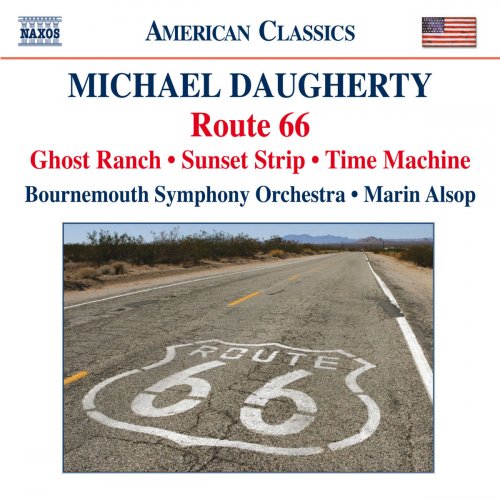
Marin Alsop, Bournemouth Symphony Orchestra - Daugherty: Route 66, Ghost Ranch, Time Machine (1998)
BAND/ARTIST: Marin Alsop, Bournemouth Symphony Orchestra
- Title: Daugherty: Route 66, Ghost Ranch, Time Machine
- Year Of Release: 1998
- Label: Naxos
- Genre: Classical
- Quality: FLAC (tracks)
- Total Time: 01:07:59
- Total Size: 339 Mb
- WebSite: Album Preview
Tracklist:
1. Route 66 (1988) For Orchestra 6:56
Ghost Ranch (2006) For Orchestra
2. Bone 6:07
3. Above Clouds 8:36
4. Black Rattle 9:27
Sunset Strip (1999) For Orchestra
5. 7 PM 4:46
6. Nocturne 3:15
7. 7 AM 9:08
Time Machine (2003) For Three Conductors And Orchestra
8. Past 7:09
9. Future 13:24
Performers:
Bournemouth Symphony Orchestra
Marin Alsop
1. Route 66 (1988) For Orchestra 6:56
Ghost Ranch (2006) For Orchestra
2. Bone 6:07
3. Above Clouds 8:36
4. Black Rattle 9:27
Sunset Strip (1999) For Orchestra
5. 7 PM 4:46
6. Nocturne 3:15
7. 7 AM 9:08
Time Machine (2003) For Three Conductors And Orchestra
8. Past 7:09
9. Future 13:24
Performers:
Bournemouth Symphony Orchestra
Marin Alsop
Here's a fine introduction to the music of Michael Daugherty, one of the most often performed contemporary American composers both at home and, increasingly, abroad. The program touches on but does not overemphasize Daugherty's use of materials from popular traditions, which form only one source of his basic musical vocabulary. Daugherty is an audience-pleasing composer but not a crossover figure, and his skill lies in vivid musical illustration, not in the reconciliation of his essentially Stravinskian language with popular music. He is not a profound structural thinker, either, and his music is strongest in situations that call for simple linear development of a single strong idea. All four of these works fill the bill. Route 66 represents a road trip down that famous highway, with lots of contrapuntal brass and wind material underpinned by fast-moving syncopated percussion. Perhaps the least-familiar work is the three-movement Ghost Ranch (2006), commissioned and premiered by the performers who play it here, Britain's Bournemouth Symphony Orchestra under American conductor Marin Alsop. Its spare textures, depicting paintings or aspects of the life of Georgia O'Keeffe, owe nothing to pop or rock, but are extremely rich in their evocation of the subject matter. The closest Daugherty comes to pop here is in the three-movement Sunset Strip, an homage to the famed nightlife district of Los Angeles, with bits of jazz floating in the night air. The second movement of Time Machine (2003), "Future," is based on the H.G. Wells science fiction novel, with sonic elements representing the above-ground aesthetes and the subterranean proletariat into which human life has bifurcated in that novel of the distant future; the work's first movement, "Past," combines quasi-Renaissance dance music, Romantic melody, and two sets of percussion events, one involving woodblocks from the work's three separate orchestras, and the other a pair of rainsticks, representing, one supposes, a still deeper layer of the past. You may or may not personally be a fan of Daugherty; for some his music has a pat quality that discourages repeated hearing. But give the man credit: there's lots of representational and programmatic music out there for which you wouldn't have a prayer of guessing the references if you hadn't been told in advance. With these pieces you might easily come close or hit them on the nose.
DOWNLOAD FROM ISRA.CLOUD
Marin Alsop Daugherty Route 66 Ghost Ranch Time Machine 98 1002.rar - 340.0 MB
Marin Alsop Daugherty Route 66 Ghost Ranch Time Machine 98 1002.rar - 340.0 MB
As a ISRA.CLOUD's PREMIUM member you will have the following benefits:
- Unlimited high speed downloads
- Download directly without waiting time
- Unlimited parallel downloads
- Support for download accelerators
- No advertising
- Resume broken downloads


